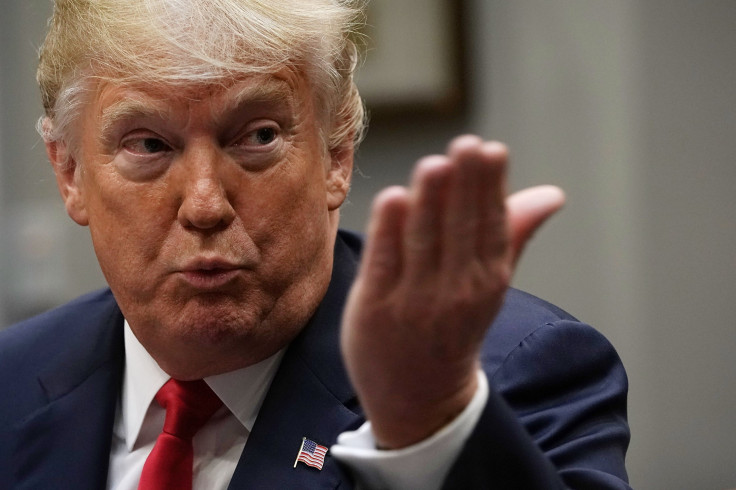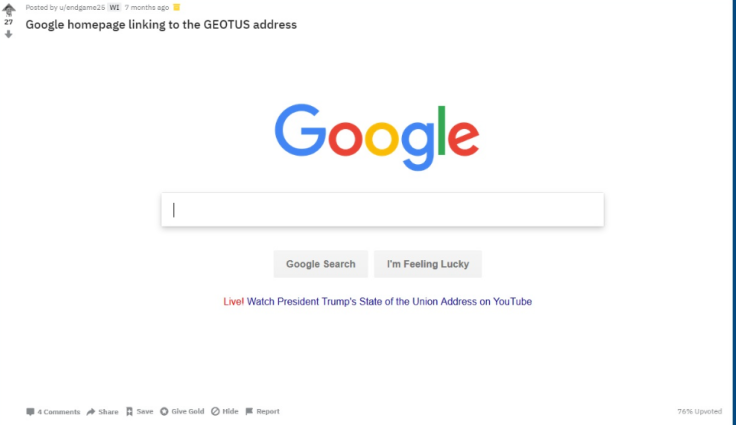Trump’s ‘Stop The Bias’ Google Video Tweet Is 'Fake News': The Facts

Taking his war with big tech companies a step forward, President Donald Trump on Wednesday pinned on top of his Twitter page a video about Google, which he claimed proved the search engine’s bias toward conservatives.
The video — featuring an ominous background music — showed a bunch of screenshots of the Google homepage on specific dates over the last seven years when former President Barack Obama and Trump delivered their State of the Union speeches to the Congress. Trump pinned the video, with the hashtag “Stop The Bias.”
The 24-second-long clip tried to drive the point home that while Google featured links to Obama’s speeches on its homepage over the years, it stopped the tradition after Trump took office.
However, the information featured in the video was factually incorrect and hence the president’s insinuation that Google was biased against him was misleading.
Here are some fact-checks about the video on the supposed biasness of Google:
Google’s Response To President’s Attack
The multinational technology company claimed they did not feature the link in 2017 for Trump’s speech to Congress just like they did not display a link for Obama’s 2009 speech because both were simply addresses to Congress, rather than being State of the Union events.
“On Jan. 30 2018, we highlighted the live stream of President Trump’s State of the Union on the google.com homepage. We have historically not promoted the first address to Congress by a new President, which is technically not a State of the Union address. As a result, we didn’t include a promotion on google.com for this address in either 2009 or 2017,” Google said in a statement, Gizmodo reported.
Google Did Feature Link Of Trump’s 2018 Speech
Contrary to the claim made in the video pinned by Trump, Google said they had featured a link to the POTUS’ 2018 State of the Union speech. To prove it, the tech mogul directed enquirers to a subreddit page run by the president’s supporters, where a screenshot of the Google homepage from Jan. 30, 2018, was posted.
In the screenshot was clearly visible a hyperlinked title reading, “Live! Watch President Trump’s State of the Union Address on YouTube.”

The Video Maker Possibly Got Screenshots From Wayback Machine
There is a high possibility that whoever made the video, obtained the screenshots from Wayback Machine, a digital archive of the World Wide Web and other information on the internet. However, the archive was not 100 percent accurate in storing records, especially when it came to keeping an account of Google Doodles and links to YouTube that sometimes featured on Google’s homepage on specific days.
According to Gizmodo, for example, a search for the date Jan. 29th, 2018, showed Google’s homepage just having the company logo, while it actually featured a Google Doodle to commemorate singer Teresa Teng’s 65th birthday.
In another instance of discrepancy, the Google logo featured in the screenshot for Jan. 12, 2016, showed an outdated version of the company’s emblem, which was changed in September 2015.
Wayback Machine Confirmed Google’s Homepage Did Feature Links To Trump’s Speech
Mark Graham, the director of Wayback Machine said while the archived links were a “bit hard” to find, screenshots from the day of Trump’s State of the Union speech did prove Google featured a link to the president’s address on its homepage.
Just a day before Trump pinned the inaccurate video on the top of his Twitter page, he launched another attack on Google:
Paula Bolyard, supervising editor at PJ Media, wrote an opinion piece on the Washington Post, saying president might have gotten the statistics from an article she wrote Aug. 25, where she had mentioned what happened when she typed “Trump” into the search engine’s “News” tab.
She clarified despite her observation, which was in no way scientific, she firmly believed the internet should be free and the government regulating private tech companies to influence political opinion would set a dangerous precedent.
“Let me be clear: While suspicions about inherent biases being baked into the systems at Google and other tech platforms are certainly warranted, I do not believe that government regulations are the answer to that problem,” she wrote in the piece.
© Copyright IBTimes 2024. All rights reserved.





















